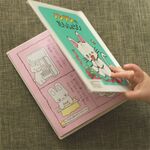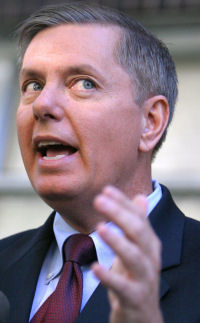Queer Theory
“Those sneaky homosexuals have taken prayer out of our schools, desecrated the institution of marriage, and ruined a perfectly good recipe for Lemon Meringue Pie!”
“Ohh, ooohhmygoodness. OHHH! OHH YES! OHHHH YESSSSS! OH! ...Ahhhhhh...”
Queer Theory is the most accepted, widespread method of literary criticism in the United States. It became prevalent in the 1990s after the LGBT community grew tired of brainwashing U.S. Senators to further the Gay Agenda. Queer Theory holds that all literary works are inherently gay, that is, that their characters and plots all contain subtle if not explicit references to hot young female secretaries who pine after the firm, yet supple breasts of their intrepid female bosses, as well as hints of sweaty young basketball players who sneak into locker rooms trying to catch a glimpse of shower water rippling over firm glutes, tight abs and pulsing pecs.
One common misconception about Queer Theory is that it stemmed from the writings of Michel Foucault and Teresa de Laurentis. While these authors should be credited for their subsequent work on the subject, it is Oscar Wilde, Friedrich Nietzsche, and Martha Stewart who laid the framework for its inception into modern classrooms.
Overview[edit]
In 1997, following Martha Stewart's Sex Change, she collaborated with Oscar Wilde, and Julia Child to write the LGBT Manifesto/Erotic Sex Manual, Mastering the Art of French Cooking, a publication that received harsh criticism due to an extended description of a single male masturbation technique that lasted a full 68 pages in the first edition. One notable exception occurred in 1999, when James Dobson, head of the Focus On The Family organization, recommended the book at the 1999 Convention for Competitive Christian Chefs, saying, "It's God's gift to all food-lovers, young and old. Master the Art for yourself, and you'll see what I mean!" He later retracted his endorsement when his next-door neighbor, a young transgendered girl named Mei Kim Shao accidentally impregnated herself as a result of attempting recipe #48, "Stir-Fry Delight." However, in America the book saw a resurgence of popularity in 2003, after Gay Marriage was legalized in Massachusetts and Kansas.
The book covers the beginnings of Queer Theory, the ultimate goals of the Gay Agenda, and Tom Cruise's genitals via a strategically placed picture of a ficus tree, which was removed by popular vote for the Second Edition.
Impact on Modern Culture[edit]
The collective writings on Queer Theory, often referred to as The Adventures of Dick and Jane, have arguably changed the way the world perceives literature. Following are several examples of its impact:
- (1997) - The successful "outing" of Batman and Robin.
- (1998) - Professor Albus Dumbledore's affair with Professor Severus Snape was featured in the National Enquirer.
- (2008) - Dr. Errol Drake of Harvard University discovered that if one were to play the Back to the Future films in sequence while listening to the complete discography of the Scissor Sisters, a refreshingly erotic gay subtext begins to surface.
Criticism[edit]
Staunch critics of Queer Theory include George W. Bush, Senator Lindsey Graham, and the collective members of The Partridge Family.
Republican Lindsey Graham is quoted as having said to Oscar Wilde, "I read your book--you know, the one about gay sex with French food in English classrooms. It was unbearable! My muscles tensed as I read it. I flushed with embarrassment during the scene when Blaise tore off Eduardo's thin muscle shirt, exposing his smooth olive skin, and eased his fingers through his denim jeans and into his Egyptian cotton briefs... [dabs his sweating forehead with a handkerchief]... oh, Lord, you should be arrested!"
Praise for the book is widespread across most countries. Oprah has publicly acclaimed the book, stating, "It makes a darn good hot pad for my casseroles." Similarly, Captain Kirk has hailed it as "[a]n adventure! unlike! any other! It goes! where no man! has gone before!"

